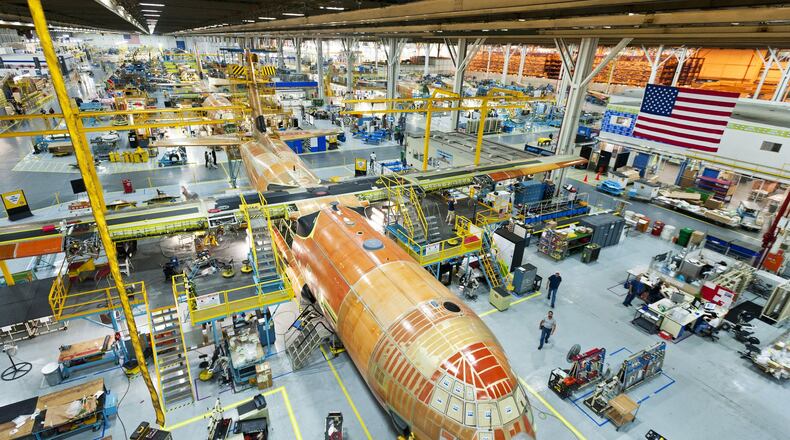Every presidential election has implications for the economy – and this one seems likely to have more than most.
Perhaps more than any other candidate in memory, Donald Trump’s ascension to the White House will almost surely bring change in a host of policy areas, from healthcare to highway budgets, from taxes to Treasury bonds.
Trump’s promise to renegotiate some trade pacts and rip up others might be a problem for many Atlanta companies that do business overseas, like Coca-Cola and UPS, or purchase materials there, like Home Depot.
But for Robin Loudermilk, CEO of the Loudermilk Companies real estate firm in Atlanta, Wednesday morning glowed with financial promise.
“I think it’s nothing but positive,” he said. “I think this changes the game.”
He cited the anticipated repeal, or at least overhaul, of the Affordable Care Act, which has provided health insurance to 16 million people but has drawn fire for complexity and rising premiums.
“I think everybody needs health insurance, but the cost was just spiraling out of control,” Loudermilk said. “It was affecting hiring decisions.”
Tax rates are likely to drop, spurring investment – including his own, Loudermilk said. “It will certainly change timing. If you have fear that tax rates are going to go up, you don’t want to commit money for too long.”
If Trump can make good on his vow to boost manufacturing jobs, it might be at least a limited boost for Georgia, said Rajeev Dhawan, director of the Economic Forecasting Center at Georgia State University.
“The textile jobs, the toy factories, the low-quality production jobs are not coming back,” he said. “What we can get are high-skill, high-quality jobs – cars, planes, specialized steel. But it is not very labor intensive.”
Atlanta could also benefit if the Trump administration pushes investment in roads, bridges and other infrastructure, said Gregory Price, an economics professor at Morehouse College.
Such spending would not only create jobs but bring a longer-term boost through more efficient transportation, he said.
“Atlanta, Georgia, is a transportation hub,” said Price. “Everyone benefits. Hotels. Tourism.”
For the markets and for the larger economy, Trump’s upset win means new uncertainty, which often boosts volatility.
Early signs were of panic: As a Trump upset took shape in the wee hours Wednesday, stock futures crashed about 800 points – seemingly promising a day of panicked selling. Instead, after conciliatory remarks by Trump, the Dow opened with a slight rise that grew into a 257-point gain for the day.
Pharmaceutical and financial stocks were among winners, with investors apparently expecting less regulation will boost their prospects, while defense stocks also gained.
Emily Sanders, managing director at United Capital Atlanta, said volatility is common after elections but will subside. “We are telling our clients that there’s no reason to change their strategy,” she said.
Adrian Cronje, partner and chief investment officer of Atlanta-based Balentine, a wealth management firm, said the key question is “whether the new administration’s policies (will) be pro-growth… and there are elements of his agenda that are pro and there are others that are contradictory.”
Cronje also said Trump’s effect on Federal Reserve Bank policy will also be key. Since the recession the Fed has held down interest rates, turning it into a powerful macro-economic force.
The Fed has been expected to raise rates slightly next month, though the effects of the election could change that plan. Moreover, Trump has been harshly critical of the Fed and its chair, Janet Yellen. If he forces her out or otherwise politicizes the bank, the results are unpredictable.
“There is a big unknown in free trade,” Cronje said. “But the biggest unknown is the Fed.”
Three of metro Atlanta’s biggest companies had little to say Wednesday.
Coca-Cola, whose CEO reportedly was on a preliminary list of Clinton vice presidential picks, said, “While we are a nonpartisan business, we always stand at the ready to work in a collaborative fashion with the President and elected officials from all sides to make our country and our economy stronger.”
UPS, whose CEO criticized campaign rhetoric on trade, said, “We look forward to the opportunities we will have to advocate our position on key business issues including trade, tax policy, infrastructure and other critical matters that impact us all.”
Delta Air Lines said it “has and will continue to work with the administration, members of Congress, and government agencies to share our views on the important policies that impact our industry, our 80,000 employees, and the more than 180 million customers who choose to fly with us each year.”
The election also could be meaningful to the Turner broadcasting business, the Atlanta-based arm of Time Warner. Trump has said he would block AT&T’s proposed buyout of Time Warner because the media is controlled by too few entities, although the Clinton campaign also had expressed concerns about the deal.
— Russell Grantham and Kelly Yamanouchi contributed to this report.
About the Author
Keep Reading
The Latest
Featured



